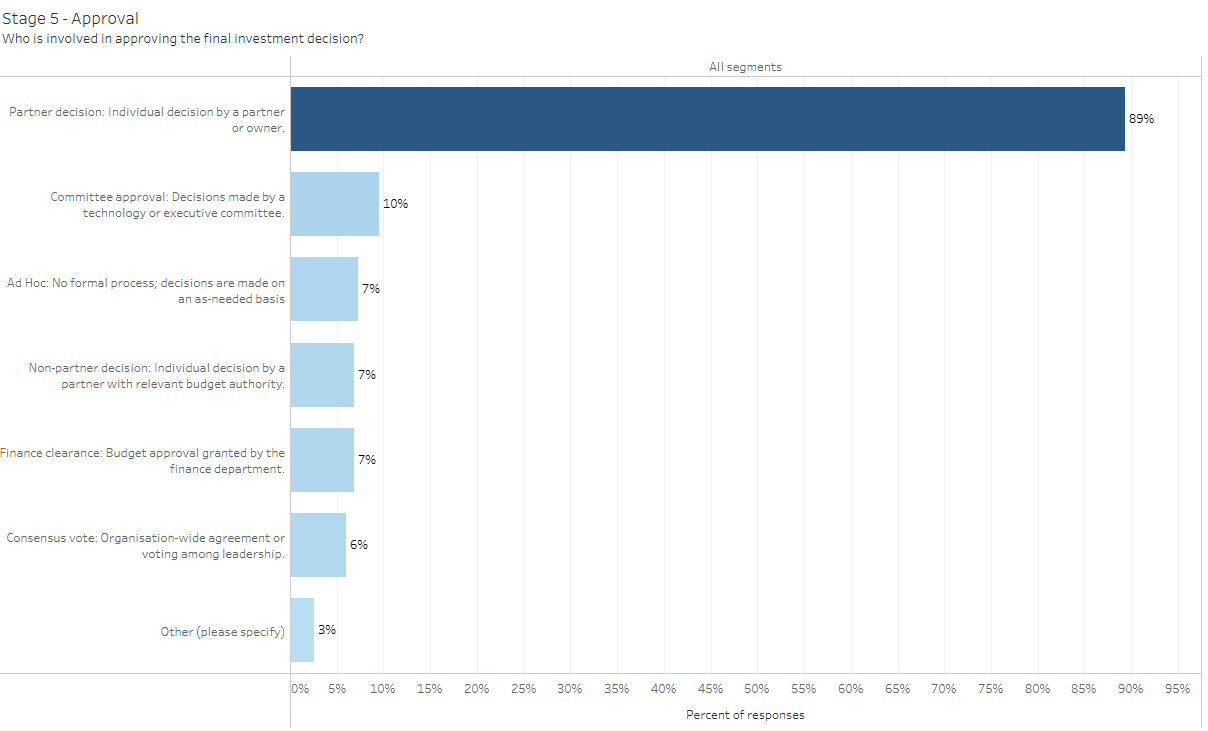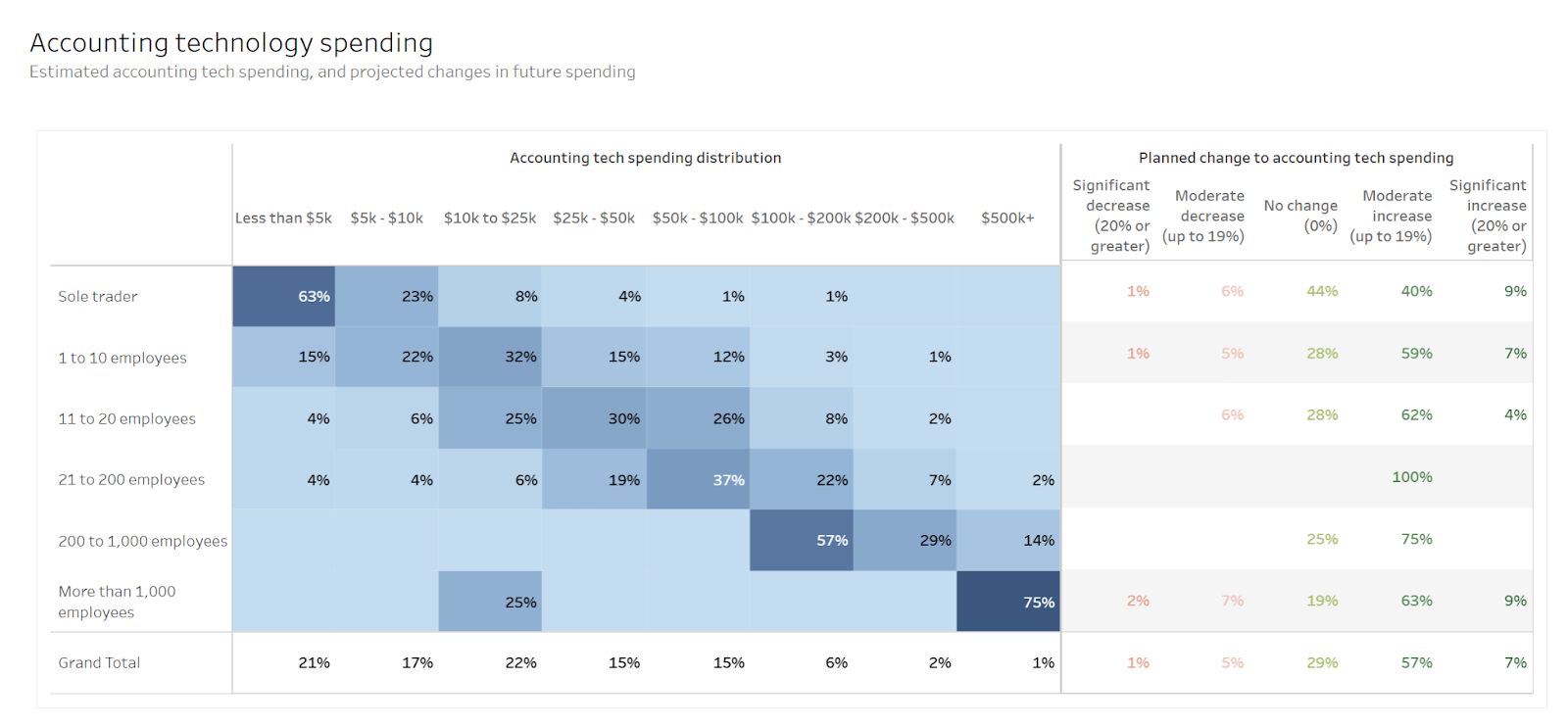
The latest survey of accounting professionals reveals that discovery is driven by trusted, community-led channels, even as tech adoption slows. While larger firms increase spend and stack complexity, final investment decisions remain firmly concentrated at the top, limiting the influence of broader stakeholder input.
Key stats you need to know
- Conferences (49%) and peer recommendations (48%) are the most common ways accounting professionals learn about new tech.
- 89% of final accounting tech investment decisions are made by a partner or owner.
- 75% of mid-large firms (200–1,000 employees) plan to moderately increase accounting tech spend over the next year.
Discovery is shaped by peer trust and industry events
- 49% of respondents discover new technology at conferences or industry expos, while peer recommendations were nearly as common, cited by 48% of accountants, suggesting that influence is driven by trust and expertise.
- Webinars (45%) and online research (44%) followed closely, showing that accountants also actively seek out education and evidence to support purchasing decisions.
For accounting tech, the discovery process is shaped by credibility and community. Accountants favour peer input and events over direct vendor contact, suggesting that influence is driven by trust. Learning about new technologies is also not a passive process, as webinars and training, and online research are also leading channels. Events and peer input may help firms and businesses identify what to explore, while webinars and active research are used to validate options and understand features in context.
“Buyers are doing the legwork. By the time they speak to a vendor, they’ve often already shortlisted based on peer feedback, online research or webinar insights,” said Michael Johnson, Director at Agile Market Intelligence.
Approval power is heavily concentrated in partner roles
- 89% of respondents said the final investment decision rests with a partner or owner.
- Committee-led decisions were reported by just 10% of firms, and all other mechanisms of decision-making accounted for 7% or less each.
Decision-making authority remains concentrated at the top, with most firms relying on a single senior figure to approve tech investments. This might support speed and accountability, depending on firm size, but also reduces the opportunity for collaborative evaluation.
There are a few more steps between discovery and final purchase approval, with influence distributed across different roles. Yet, unless that influence reaches the partner level, it rarely shapes the final decision. Tech solutions must address both operational value, and partner-level business cases to close the loop between interest and investment.
“Most firms are still running top-down decision processes for tech spend. That creates clarity, but also risk, especially if the partner does not engage deeply with the operational side of the tools,” said Michael Johnson.

Large firms are driving tech spend growth
- In the next 12 months, 75% of mid-large size firms expect moderate increase in spending, while 72% of large firms expect moderate to significant increase.
- Across the market, at least half of firms are planning to increase tech spending.
Tech spend scales with organisation size, but so too does the complexity of the buying journey. Larger firms are more likely to involve multiple roles from discovery through to evaluation, even if final approval still sits with a partner. This results in longer timelines and more structured procurement processes.
Smaller firms however, remain a vital part of the market. Their spend may be smaller, but their decision cycles are faster and more direct. With final decisions resting on partners or owners, smaller firms can bypass internal bureaucracy and can move quickly when the value is clear.
“Smaller firms are agile and commercially focused. They might not spend as much, but their buying journey is faster, and they represent a large share of the market. You cannot overlook them,” said Michael Johnson.

About the research
The interim results from the 2025 Agile Market Intelligence Accounting Tech Review are based on survey responses collected from 501 accountants and bookkeepers across Australia to date commencing in March 2025.
The report is designed to benchmark platform performance across private practice and in-house accounting professionals. It captures perceptions around functionality, service quality and platform features, with year-on-year comparisons. Data has been weighted by firm size and role seniority to ensure a representative cross-section of the market.
We encourage all accountants and bookkeepers to contribute to the research here.
The survey closes on 31st July 2025 and will take 10 minutes to complete with participants rewarded for their time via a prize draw.
A public version of the report will be made available to participants and industry in early November 2025. For more information about the full report, including the competitive analysis tool for technology providers, please contact jarrad.nash@agilemi.com.au.


